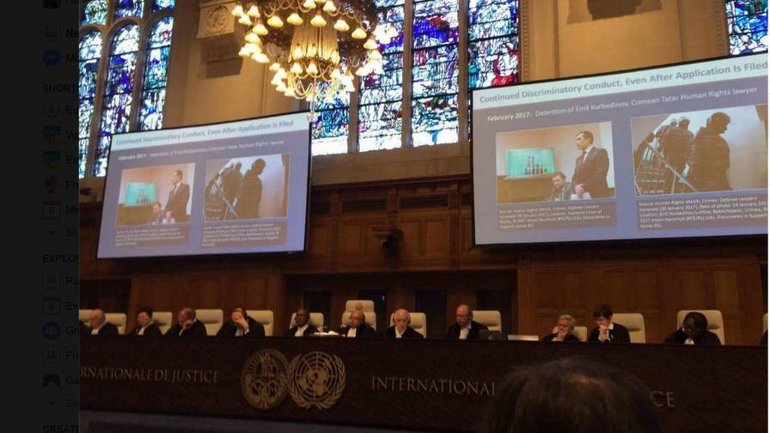Russia in the Hague accused of terror and discrimination in Crimea and funding terrorism in Donbas


Yesterday, on the first day of hearings into its case against Russia at the International Court of Justice, Ukraine presented a weight of arguments and examples to back its accusations against Russia over its annexation of Crimea and gross violations of human rights under occupation, and over its financing of terrorism in Donbas. While Russia denies all charges, Ukraine’s case is backed by documents from the UN, OSCE, Parliamentary Assembly of the Council of Europe, international human rights organizations, as well as NATO satellite imagery.
Russia is likely to argue that the court does not have jurisdiction, hoping that the ICJ will agree to this, as it did in 2011 over the war between Georgia and Russia. It is, of course, for the Court to decide, but the situation this time seems quite different for a number of reasons. One of the key focuses in Ukraine's suit is on the compelling evidence of grave erosion of fundamental rights and liberties in Crimea under Russian occupation. It is no accident that human rights activists played a considerable part in compiling evidence for the court.
If the Court does agree that there is a case to answer, examination of all the evidence could take several years, and both the military conflict in Donbas, and the discrimination and political persecution in Crimea are ongoing. For this reason, Ukraine’s lawyers on Monday stressed the need for specific provisional measures now to prevent still further irreparable damage.
In a 45-page document, Ukraine presents its reasons for accusing Russia of violating two UN conventions, namely the International Convention for the Suppression of the Financing of Terrorism and the International Convention on the Elimination of All Forms of Racial Discrimination.
Although the International Court of Justice has no instruments to enforce its judgements, the very fact of it finding against Russia would have enormous weight. ICJ is the official judicial organ of the United Nations, which Russia has been a member of from 1945. It cannot now turn around and say that it won’t accept its authority. This was precisely what Russian President Vladimir Putin tried to do with the International Criminal Court a day after its Chief Prosecutor published her preliminary conclusion that Russia’s annexation of Crimea constituted an international military conflict between the Russian Federation and Ukraine. Putin’s instruction made headlines, but in fact had little legal meaning. Neither Russia nor Ukraine have yet ratified the Rome Statute, which would make them members of the International Criminal Court, however Ukraine has accepted its full jurisdiction over the events in Donbas and Crimea. Russia can petulantly refuse to ‘play’, but this does not remove its accountability.
A judgement against Russia may not force the latter to stop its aggression and its rights violations, but it would be another strong argument against those politicians in other countries who have expressed willingness to make deals with Russia involving at least Ukraine’s tacit acceptance of Russian rule in Crimea. Just the outline of repression and terror tactics in Crimea given on March 6 make it clear why that cannot be accepted.Denying it supplied and continues to supply weapons to Donbas militants, the Russian representative at the trial in Hague Ilya Rogachov said today the rebels found the weapons stored in mines or left by the Ukrainian army withdrawing from eastern Donbas.
“The main source of weapons for Donbas militants were the ones left over from the Soviet times, he said.
Rogachov did not elaborate on Ukraine’s evidence of supplying to the rebels the newest weapons used only by the Russian army.
It is worth recalling that the main warehouse of the old Soviet weapons is located in Bahmut. In 2014, the militants made several attempts to seize it – without any success.
Pres. Putin also denies the presence of Russian regulars in Donbas, numbering 5,000, according to experts.









